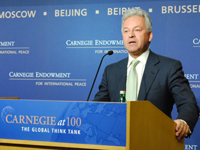{
"authors": [
"Alan Duncan",
"Marwan Muasher"
],
"type": "event",
"centerAffiliationAll": "dc",
"centers": [
"Carnegie Endowment for International Peace"
],
"collections": [],
"englishNewsletterAll": "menaTransitions",
"nonEnglishNewsletterAll": "",
"primaryCenter": "Carnegie Endowment for International Peace",
"programAffiliation": "MEP",
"programs": [
"Middle East"
],
"projects": [],
"regions": [
"Middle East",
"North Africa"
],
"topics": [
"Economy",
"Security"
]
}
Security and Development in Fragile States
Tue, December 14th, 2010
Washington, D.C.
Despite severe austerity measures in the United Kingdom, the UK coalition government has pledged to increase funding for development assistance to 0.7 percent of GNI from 2013. UK Minister of State for International Development Alan Duncan explained why foreign aid—particularly in fragile states—is both a moral imperative and a key element of protecting national security. Using the example of Yemen, he addressed the challenges of working in fragile states and the need for an integrated development approach. Carnegie’s Marwan Muasher moderated.
The Aid Imperative in Fragile States
The United Kingdom has committed to double its aid to fragile states because they represent both the greatest development needs and the largest threats to international security, Duncan explained.
- Fragility and Poverty: Conflict hinders development, and people living in conflict-affected countries face the triple burden of poverty, insecurity, and a lack of prospects for sustainable growth. No fragile state has achieved a single Millennium Development Goal, and such states account for disproportionate numbers of people in extreme poverty, children without access to school, and child mortality, among other indicators.
- National Security: Poverty increases the risk of violent conflict, so any meaningful and lasting response to conflict must focus on development to succeed. Instability in fragile states has direct consequences for international security and contributes to migration crises and terrorism.
- Results and Cost-Effectiveness: Aid to fragile states may be riskier and more difficult to measure than conventional assistance, but it brings important results. If aid can prevent a state from collapsing, it is much more cost-effective than dealing with the consequences of that collapse.
The UK Development Approach
Duncan emphasized the importance of coordinating development programs across government sectors and between donors, and in providing space for local solutions to develop rather than imposing Western models.
- Development, Diplomacy, and Defense: The United Kingdom has established a new National Security Council to bring together its diplomatic, defense, development, and domestic security apparatuses and create an integrated approach to assist conflict-affected countries. This step recognizes the key role of development in national security, but does not mean that assistance is being diverted from development to military objectives.
- Multi-donor Cooperation: Fragmentation of donor assistance can create additional problems in fragile states. As a result, donor states must work together to adopt coordinated approaches.
- Finding Local Solutions: Every fragile state faces different challenges, and there is no single template to promote stability and development. The United Kingdom is thus not seeking to impose its models or solutions on fragile countries, but rather to help give local actors the space to shape their own development process.
Spotlight on Yemen
Yemen is a country on the brink of collapse, with fragility and terrorism creating problems both within and outside Yemen. UK assistance has sought to look beyond the terrorist threat to help Yemen resolve the roots of its crisis, Duncan explained.
- Challenges: Yemen has some of the worst economic and social indicators in the world, and violent extremism threatens both Yemen’s government and international security. Weak governance and tribal divisions have made it difficult to build a stable nation-state.
- UK Assistance: The United Kingdom has helped to build schools and classrooms in Yemen, improve local services, and provide more than 10 million days of employment for the country’s poorest citizens. This effort is just the beginning of the UK’s support, which must do more to help promote jobs, government responsiveness, child health, and an inclusive National Dialogue that will lead to elections. All of this will be done in coordination with its Yemeni partners.
- Progress: Yemen has implemented an IMF economic program, a ceasefire with Houthi rebels in the north, and launched a National Dialogue process. Yet gains are fragile, and could be reversed.
- Multilateral Approaches: The lack of coordinated international assistance to Yemen has sometimes been more of hindrance to Yemen than a help. The multilateral Friends of Yemen process represents a critical advance in coordinating international assistance; it now needs to propose a unified, Yemeni-led development program through which donors can channel their support. Yemen’s neighbors—Saudi Arabia and Oman—must play a particularly critical role in promoting collective solutions.
Carnegie does not take institutional positions on public policy issues; the views represented herein are those of the author(s) and do not necessarily reflect the views of Carnegie, its staff, or its trustees.
Event Speakers
Alan Duncan
Marwan Muasher is vice president for studies at Carnegie, where he oversees research in Washington and Beirut on the Middle East. Muasher served as foreign minister (2002–2004) and deputy prime minister (2004–2005) of Jordan, and his career has spanned the areas of diplomacy, development, civil society, and communications.
